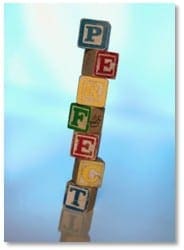Do Universally Perfect KPIs Exist?
by Stacey Barr |If you go looking for KPIs or performance measures, you’ll often come across articles that debate the pros and cons of various measures, or that compare the merits of one measure to another. But don’t be fooled: the search for the measures that are best for everyone is a search in futility.

A recent article published on Palladium’s website was entitled “Net Promoter Score and Other Misleading Customer Metrics” and it discussed why three commonly used performance measures for customer satisfaction should be avoided. But I disagree.
In the article, the author argued against the use of three types of customer-related performance measures, including Customer Surveys, Customer Complaints and Customer Loyalty. His points about the limitations of these measures were certainly valid, but not sufficient argument that those measures be abandoned. Here’s why:
Customer Surveys
Let’s get one thing straight up front: surveys are NOT measures!
Surveys are one tool that’s used to collect all kinds of data from customers, for use in computing a wide array of possible performance measures, including (but not limited to) Average Overall Customer Satisfaction, Average Likelihood of Remaining a Customer and Net Promoter Score.
As the author argues, many organisations send out their customer surveys and hope for a 10% response rate. He’s right in that this approach to surveying customers does produce data that is not representative or reliable enough to draw conclusions from. But that’s a problem with the survey design and implementation, and not a problem with the relevance of the measures for which the survey collects the data.
Don’t abandon customer metrics that come from survey-collected data. Just make sure your survey (including the random sample of customers) is well designed to collect the data for your chosen measures, and that it’s implemented properly by getting professional advice from a survey statistician.
Net Promoter Score
The author was also critiquing a popular measure called the Net Promoter Score as “a fairly useless metric because low scores do not provide any data to determine the reasons for customer dissatisfaction.” No single measure will provide those reasons, not even Average Overall Customer Satisfaction. The measures are for tracking trends or changes over time in a particular result. You also need to collect other quantitative and qualitative data to explore reasons why.
The purpose of the Net Promoter Score is to gauge or estimate customer loyalty by examining the intentions of customers to tell others about your organisation’s products or services. It’s not a measure of how satisfied customers are, it’s a measure of how likely they are to recommend you to their friends or colleagues. Two different results, even though they are related to one another. One measure can’t evidence all results.
Customer Complaints
Simply counting the number of customer complaints you get is not going to give you the necessary insights to improve customer satisfaction and loyalty, but it can be part of the equation. It’s got its limitations, as the author of the above article points out, like not being representative of all customers and of different complaints having different severity levels.
But the author missed the idea that measures are evidence of specific results. If you have a result to dramatically reduce customer complaints by fixing quality issues with your product or service, then tracking the number of valid customer complaints you get is a reasonable measure, even though the complaints themselves may not be representative of your whole customer base. The trend over time of the number of real complaints still carries some useful evidence.
Customer Loyalty
Just like ‘Customer Surveys’, customer loyalty isn’t a measure either. It’s a concept that actually needs a bit more definition before it becomes measurable. Is it the percentage of customers lost? Or the percentage of customers with repeat business? Or is it the length of the customer relationship? Or is it the share of the customer’s wallet that your organisation gets? It can be a number of different things, so defining it is critical in validly interpreting what it means to your organisation.
So depending on how you define customer loyalty, it may be a lag measure, or it may be a good indicator of how well you keep your customers once you attract them.
Do Universally Perfect KPIs Exist?
No. And we don’t need to have universally perfect measures. We just need measures that have sufficient strength to gauge the results we’re trying to achieve and that are feasible enough to monitor and report so it’s worth the effort and cost.
The only way to find the BEST measures or KPIs for you is to start with a very clear understanding of the performance results you’re trying to achieve, design measures that best evidence those results, and make sure you have a robust method of gathering reliable and representative data to monitor those measures through time.
Searching for universally perfect measures is a waste of time.
TAKE ACTION:
Design your own fantastic measures or KPIs – or evaluate existing potential ones – with the PuMP Measure Design technique, which is one of the practical templates that feature in the PuMP Blueprint Online Program and the PuMP Blueprint Workshop. The PuMP Blueprint will also help make sure you’re first very clear about the performance results you want to achieve. You can’t measure ill-defined goals.
Connect with Stacey
Haven’t found what you’re looking for? Want more information? Fill out the form below and I’ll get in touch with you as soon as possible.
167 Eagle Street,
Brisbane Qld 4000,
Australia
ACN: 129953635
Director: Stacey Barr




